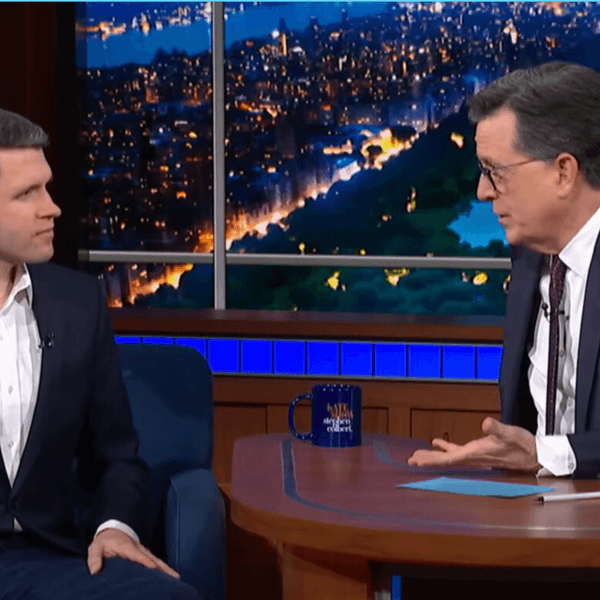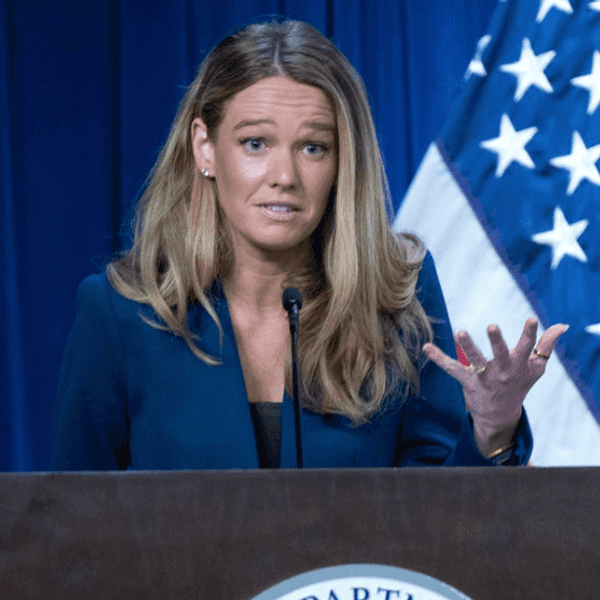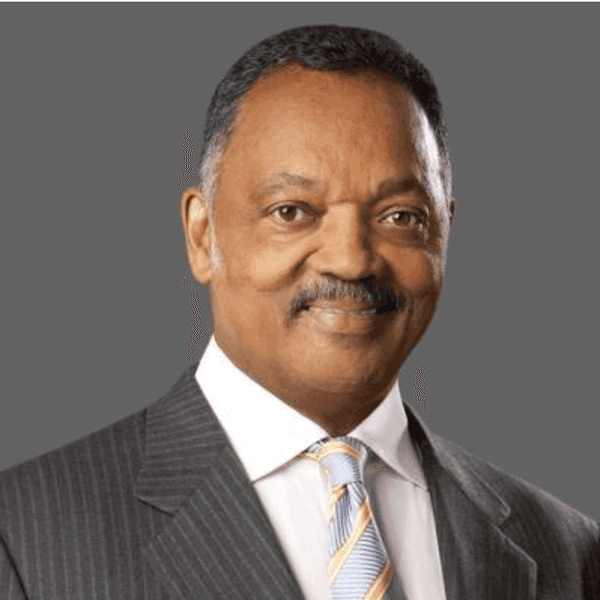
Reprinted with permission from Alternet.
The links between President Trump and Russia will prove to be deeper and darker than many Americans now believe. This is according to Timothy Snyder, a noted historian of the 20th century’s tyrannical regimes in Eastern Europe, who said the U.S. is now moving down a cultural and political path that has much in common with Russia under Vladimir Putin’s authoritarian and oligarchic rule.
“Where I am coming from is, it can happen. It happens to people like us. And it’s happening now,” he said, speaking in mid-June at the International Festival of Arts and Ideas at Yale University where he is a history professor. “It’s happening now. We’re not in some strange dream. We’re not in some American exceptionalist moment. We’re in a moment where this is happening throughout the West.”
Snyder is author of the late-2016 pamphlet On Tyranny: Twenty Lessons From The Twentieth Century, which warned what a Trump presidency could bring and noted how widespread civic resistance could stop American authoritarianism. In his speech, he described how Trump was relying on Putin’s Russia as a model for where he was taking America. Some of this is already known, such as Trump’s campaign links to Russians and Americans working for Russian political allies and oligarchs. And some is not widely known, such as how Russia’s major way of interfering in the election was not hacking into voting machines or even stealing Democratic Party emails, but rather funneling propagandistic pro-Trump messaging via Facebook to sway voters in swing states.
Overall, Snyder’s message is that the United States is not unique—neither in the world today nor against the backdrop of history—in being pushed in more authoritarian directions. If anything, Trump is exploiting the same tactics Putin and state-run media in Russia use, but with the American addiction to 24/7 media and smartphones and other devices, we’re making it easier for an emerging authoritarian like Trump to consolidate his power.
“What’s happening to us in the United States of America in 2016, 2017, it isn’t just happening here,” he said. “In the first decade of the century, history was going from the west to the east. That hasn’t been true for some time… For the past several years, history has been coming from the east to the west… The cyber war, fake news, those things are old news in some places…. They are only new here. The fact we’re shocked by them is because we’re provincial. We’re not paying attention.”
“The question I want to ask here is, what have we gotten us into?” Snyder says, launching into the facts that have become known in the nearly six months since Trump and the GOP have taken office.
“We are going to learn all kinds of things. Not everyone agrees with me… but I think we are going to find out that the connections between the Trump campaign and various Russian actors were deeper, darker and more spectacular than we could have imagined. I am pretty sure that’s how it’s going to turn out. But even if I am wrong, the Russia connection is very important because Russia is a model of how you run a 21st-century, postmodern, authoritarian, kleptocratic, unequal regime. And it is a positive model for the president of the United States… It’s also a model of how you use terrorism, the threat of terror and the reality of terrorism, to stabilize inequality over the long term; a positive model, as the president himself has said, for how you use the politics of terror.”
Snyder said Russia is important not merely because it meddled deeply in the 2016 election—just as it has meddled in recent elections across Europe—but “because Russia is a possible future. That is the way that we are heading.”
Turning back to the 2016 election, he said Russia’s biggest impact wasn’t just stealing email from the Democratic National Committee and Hillary Clinton campaign. Trump urging the Russians to keep finding and releasing emails was an overlooked telltale sign.
“Now we know that there was much more of it and it was much more profoundly important than was understood,” he said, “that the main element of the Russian intervention in the election had to do with gathering political data about tens of millions of Americans, and then using Facebook and other platforms to target fake news to people who were regarded as susceptible, especially in the last weeks before the election, which probably determined the outcome in critical states that were targeted, which probably determined the outcome of the election as a whole. This isn’t to say that there aren’t other reasons, and in my view, good reasons, why people could vote for Mr. Trump. It isn’t to say that Hillary Clinton ran a wonderful campaign either. It’s just to say that in a very close election, that probably made the difference.”
Snyder emphasized he was not alone in this conclusion.
“This isn’t just me saying this,” he said. “These are the conclusion of America’s intelligence agencies as well as, although you have to read between the lines a little bit, the conclusion of Facebook itself. Facebook has acknowledged it was used in this way.”
Trump’s Russian Dossier
Then Snyder went through the Trump campaign’s senior staff who had personal connections to Russian allies, oligarchs and Putin. He started with Paul Manafort, who didn’t take a salary, but managed Trump’s campaign through the Republican National Convention.
“Paul Manafort was not paid by the Trump campaign. On the other hand, he was on a million-dollar-a-year contract for several years for an oligarch close to Mr. Putin to soften up American democracy for Russian influence. That could be a coincidence. You could say that job ended before the campaign. That’s true because Mr. Manafort took up another job [after the convention], which was to be the main strategist for the Ukrainian president, Viktor Yanukovych, who Mr. Manafort helped back to power.”
There’s plenty more, he said. “Trump’s first foreign policy speech was written by someone who was on the payroll of a Russian gas company… We knew that Mr. Flynn, his national security adviser, was paid $45,000 by a Russian propaganda outlet upon which he had appeared multiple times… Now we have a secretary of state who was given the Order of Friendship by Vladimir Putin, which might be a curiosity in a different context—but is not a curiosity at all. We have an attorney general, the highest law enforcement official in the land, who perjured himself in his own confirmation hearings under oath on precisely the question of his contacts with Russia. We have a senior adviser in the White House who happens to be the son-in-law of the president, Mr. Kushner, who also lied in order to get security clearance—which, if you were a normal person would be a problem, right? If Mr. Sessions were a normal lawyer, he could be disbarred, right? If we had a rule of law state, Mr. Kushner could not get security clearance because he left out his contacts with Russian officials.”
Snyder continued, saying Trump’s firing of FBI director James Comey—who was heading the investigation into his campaign ties to Russia—and his threats to fire Robert Mueller, who took over that investigation, were tantamount to confessions.
“I wish I was making this stuff up,” he said. “And Mr. Trump’s personal lawyer is the personal lawyer of the main Russian oligarch. A man named Oleg Deripaska, who is very close to Mr. Putin, and he was also very close to Mr. Manafort. Now it could possibly all be a coincidence, but we could ask the question a different way: couldn’t the president have a lawyer who is not also the lawyer for the other side? If the president is denying his connections to Russia, could he not find a lawyer who is also not representing the Russians? Right? There are a lot of lawyers and they are not all representing Russian oligarchs.”
Snyder’s inventory of Trump’s ties to people doing business in Russia and to wealthy or powerful Russians was in the service of a larger point. He believes that the same kind of authoritarian rule that now exists in Russia is where Trump is taking the country. The story that Americans tell themselves about being exceptions to history—all the shining city on a hill stuff—is clouding our ability to see that this is exactly what’s happening, he said. The reason we look at history, he added, is not just to familiarize ourselves with what’s possible, but to recognize dangerous trends and try to prevent them. What’s currently working against that is the country is getting used to Trump’s antics, his lies and deceptions, and his policies that are going to transfer more wealth from the man to the few.
“I’m trying to get us out of this trap where we get bombarded with bad news, and we empathize with our friends, but we’re not sure what to do and then the next day is the same. And you get enough days like that, and then everything normalizes and then it’s too late, and then you’re done,” he said. “And then you have an authoritarian regime and then your children don’t know what freedom is.”
What Can Be Done?
Snyder recounted the biggest lessons from his book on resisting tyranny.
“The first is, don’t obey in advance,” he said. “When we imagine a Hitler or a Stalin, we imagine a fully formed supervillain coming onstage. That’s not how it happens. What’s necessary is consent. Consent can be not doing anything, looking away, saying that it’s normal, saying that it can’t happen here, saying that the institutions are going to save us, and doing nothing—that’s consent. That’s the kind of consent that authoritarian regimes need. They need some act of participation, but mostly they need that kind of consent.”
“If authoritarian regime changes are to be resisted, they have to be resisted in the first six to 18 months,” he continued. “If they are not, then you lose the chance to do anything. The devastating psychological-political connection is when you say, ‘It can’t happen here,’ or, ‘Well, I’ll do something tomorrow,’ or ‘Well, my friends aren’t doing anything yet,’ and then the time passes. The tragedy is then that you have lost time that you cannot get back.”
His second lesson is to support institutions—even if that means pressuring a Congress poised to do bad things (like taking healthcare away from tens of millions), because the American form of government needs to be pushed into exercising checks and balances. Similarly, professionals need to stand up for and assert professional standards as a counterpoint to unethical and unprofessional activities at the top of the government. “If lawyers and doctors and civil servants just hold steady, just hold onto some notion of what’s normal and good, then that can slow things down a lot,” he said.
Third is not allowing oneself to be forced into hiding—as is already happening with many people in communities of color where family members don’t have legal visas. He said people need to organize in public and not buy into the myth of lone heroic actors.
“In the American idea of freedom, it’s always that lone person against the overwhelming power of the government. And I am here to tell you in that situation in real life, the lone person always gets completely hammered. Or the lone person never actually makes that stand because when you’re a lone person you don’t make stands,” he said.
Finally, he said that the truth—and fighting for fact-based thresholds for political debate and decisions—matters greatly. The descent into media ghettos and social media silos of like-minded people with shared but erroneous beliefs is what allows authoritarians to take power, he said, and that is another similarity between the U.S. and Russia under Putin.
Modern authoritarians “go after the truth,” he said. “And they go after it in a three-part scheme. You fill the public space with lies and contradictions; you don’t acknowledge they’re lies and contradictions. Step two is you say it’s the journalists who lie. Step three is, if you win, everybody says, ‘Well, maybe’s he’s right. What is truth? Who knows? You have your story, I have my story. I’m just going to watch Netflix.'”
“’I’m just going to watch Netflix’ is what Putin has tattooed on his thigh,” he continued. “I’m just going to watch Netflix is basically how Russian-style authoritarianism works. People spending huge amounts of time in front of the screen, not believing that any of it is true, but—this is modern nationalism—preferring their own country’s untruth to the untruth of other countries, right?”
“That’s what it comes down to in the end. When you achieve this state of doubt, you end up creating this weird kind of nationalism—which if you haven’t noticed in the U.S. you are not getting out enough. A weird kind of nationalism where people say, ‘Well, it’s not true. The press is not true. The journalists, the media, the media.’ And yet you prefer your own untruths. That’s what modern right-wing authoritarianism looks like and that’s where we’re moving.”
Snyder said such chaotic clashes between fake news and the truth have been persistent features of authoritarian regimes. Under Germany, there was the fantasy of the National Socialists representing “the people,” which wasn’t the same as all people. Communists had different fantasies about utopian futures that were cited to justify a catalog of power-grabbing abuses and maltreatment of citizenry. What worries him the most about Trump’s Russian connections are not his associates’ personal ties, per se, but how American society, culture and its political institutions are becoming Russia-like.
“Democracy is failing in many parts of the world today,” Snyder said, in closing. “A nationalist will say it can’t happen here, which is the first step toward disaster. A patriot says that it could happen here, but that we will stop it.”
Steven Rosenfeld covers national political issues for AlterNet, including America’s democracy and voting rights. He is the author of several books on elections and the co-author of Who Controls Our Schools: How Billionaire-Sponsored Privatization Is Destroying Democracy and the Charter School Industry (AlterNet eBook, 2016).
This article was made possible by the readers and supporters of AlterNet.








